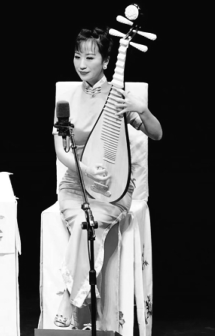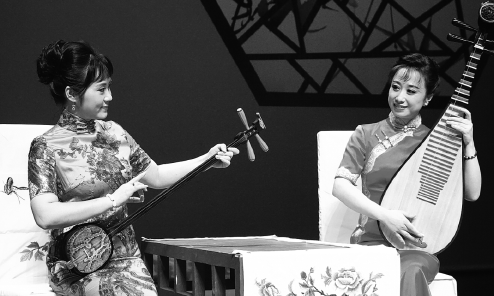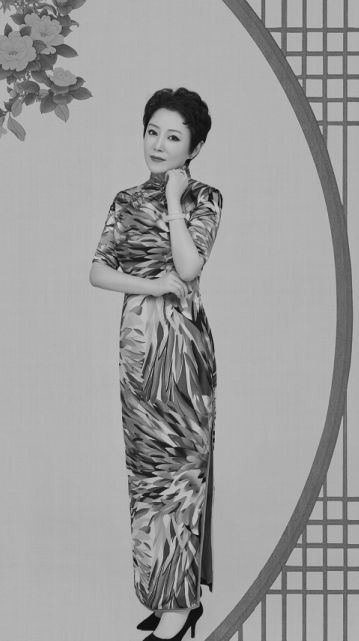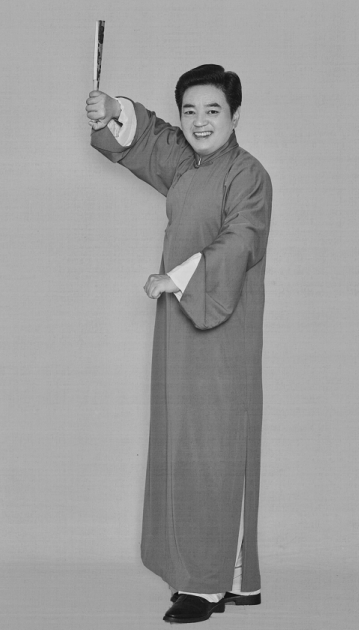Pingtan, an art form traditionally popular in southern China, will be presented in shows in Beijing, Chen Nan reports.
As a child growing up in Suzhou, East China's Jiangsu province, Wu Jing loved to go to teahouses with her parents and grandparents to watch pingtan performances.
"The tasty snacks drew me there," recalls Wu, adding that teahouses in China usually offer audiences a variety of foods, like cakes, candies and sunflower seeds. "It is a happy time for a child."
Pingtan originated in Suzhou during the Song Dynasty (960-1279). It usually involves just two performers: one male and one female, who play traditional musical instruments, sanxian (a three-stringed plucked instrument) and pipa (a four-stringed lute), while singing ballads and telling stories of ancient heroes, tragic lovers and other classic Chinese folk tales in the Suzhou dialect at teahouses or small theaters.
Unlike Peking Opera, another major art form with a 200-year history that has high-pitched singing and martial arts, pingtan performers usually sing in softer and more narrative voices. The art form has a stable following in the southern areas of the Yangtze River, such as Shanghai, Suzhou, Hangzhou and Nanjing.
"It's a lifestyle for people in my hometown to watch pingtan performances. There are hundreds of venues in the city where pingtan shows are staged daily. People enjoy it while sipping tea and eating snacks," says Wu, who naturally fell in love with pingtan and later studied at a pingtan school in Suzhou. "When you visit Suzhou as a tourist, you have to watch pingtan performances to make your trip complete."
Now, as the vice-president of Suzhou Pingtan Theater, an established art group in the country, founded in 1951, Wu has been practicing the art form for decades and won numerous national titles. These included the China Quyi Peony Awards, the country's top award for quyi, a general term for folk art forms, including ballad-singing, storytelling, crosstalk and clapper talk.
Along with over 30 pingtan performers of the theater, Wu will perform two shows on Monday and Tuesday at Beijing's Tianqiao Performing Arts Center, featuring 17 performing styles of pingtan.
The shows are part of the Suzhou Arts and Culture Week that runs from Jan 6-20, and the ongoing 22nd Meet in Beijing International Arts Festival and the Meet in Beijing Olympic Culture Festival.
Classic pingtan songs, such as Yue Yun, which tells the story of Yue Yun, the eldest son of Yue Fei, a military commander of the Southern Song Dynasty (1127-1279), and two songs about Cui Yingying, the protagonist of Romance of the Western Chamber, a well-known Chinese drama written by playwright Wang Shifu during the Yuan Dynasty (1271-1368).
Besides old classics, new pingtan works include modern takes on old stories and adaptations based on social events or topics.
One of the songs to be performed in Beijing is Heroic Captain, written by Wu and premiered last year, which is based on a real incident. On a Sichuan Airlines flight on May 14, 2018, the cockpit's windscreen suddenly shattered 9,000 meters above sea level en route from Lhasa to Chongqing. Withstanding extreme cold, a shortage of oxygen, strong winds and earsplitting noise, the pilot Liu Chuanjian operated the airplane manually, managing to bring 119 passengers and nine crew members to the ground safely. The story was adapted into the 2019 Chinese movie The Captain, which grossed over 2.8 billion yuan ($441 million) at the box office.
"Usually pingtan performers write original stories after they've gained yearslong stage experience. They know the tempo of the show and the need of the audience. The ability to create new stories and new songs guarantees the longevity of a performer," says Wu, who wrote her first original pingtan piece, titled Wang Fu Qing Chou, containing 15 chapters and over 200,000 words, in 1995, when she was pregnant.
According to Wu, although largely popular in southern China, the art form has gained fans in northern China.
"Despite the dialect barrier, audiences in northern cities are prepared to come to our shows. It all depends on the actors and actresses, who, with two chairs, one table and simply two musical instruments-pipa and sanxian, take the audiences through stories and switch roles," says Wu. "The atmosphere is relaxed."
Award-winning performer Wang Chiliang, 56, also a Suzhou native, who joined the Suzhou Pingtan Theater in 1987, says, "Pingtan performers take years to obtain solid performing skills and we need to make changes to lyrics and improvise the music according to audience response."
He will perform four pingtan songs in Beijing.
As a student of Liu Lanfang, a veteran artist of pingshu, a form of oral storytelling that dates back to the Song Dynasty, Wang has absorbed different performing styles and techniques, which allow him to meet the needs of audiences of both southern and northern China.
"For lots of Chinese quyi art forms, a great show is a result of the cooperation among performers and audiences. The response of audiences is crucial for the performers," he says. "We have to perform as much as possible to gain the ability to improvise. There is no shortcut."
According to Wu, 50 percent of pingtan performers are under 35 years old, which keeps the art form vibrant.
Xie Lan, 28, is one such performer who will also perform in Beijing. Born and raised in Suzhou, she joined the theater in 2013 after graduating from Suzhou Pingtan School.
"I can still recall the moment when I made my debut in a small theater of a community in Suzhou. I was very nervous and performed a classic pingtan song. The audiences, mostly the elderly, were supportive of young artists, which made me relaxed and confident," says Xie, who gives about 240 shows a year across the country.
She shares her daily practice and rehearsals on social media, hoping to attract younger audiences.
"For people who live in fast-paced cities and have full-time jobs, it's a luxury to spend a few hours sitting in a teahouse to enjoy the old art," Xie says. "But that's what people need-to slow down and have a good time."
Contact the writer at chennan@chinadaily.com.cn

Pingtan performer Xie Lan CHINA DAILY

Two pingtan shows are scheduled on Monday and Tuesday at Beijing's Tianqiao Performing Arts Center. CHINA DAILY

Wu Jing, vice-president of the Suzhou Pingtan Theater CHINA DAILY

Award-winning pingtan performer Wang Chiliang. CHINA DAILY